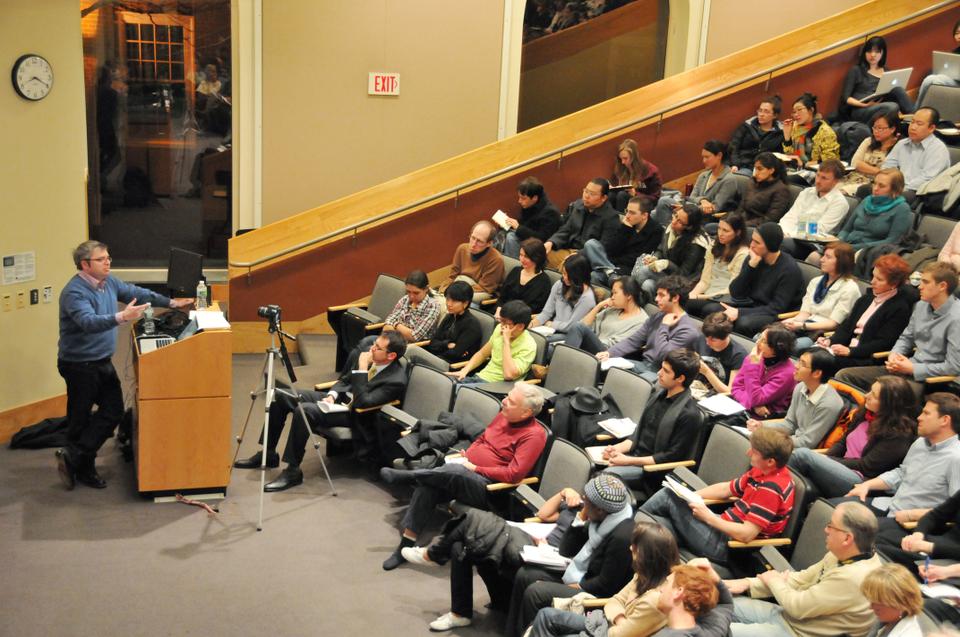
News
Harvard Quietly Resolves Anti-Palestinian Discrimination Complaint With Ed. Department

News
Following Dining Hall Crowds, Harvard College Won’t Say Whether It Tracked Wintersession Move-Ins

News
Harvard Outsources Program to Identify Descendants of Those Enslaved by University Affiliates, Lays Off Internal Staff

News
Harvard Medical School Cancels Class Session With Gazan Patients, Calling It One-Sided

News
Garber Privately Tells Faculty That Harvard Must Rethink Messaging After GOP Victory
Novelist Harding Recalls Fighting to Write
Pulitzer Prize winner reads from “Tinkers” and recounts laborious writing process

“I read like a magpie,” author and former Harvard expository writing preceptor Paul Harding said to a packed audience in Boylston Hall’s Fong Auditorium last Tuesday evening. His comment referred to his obsessive habit of reading the stacks of books in every room in his house, as well as the breadth of his reading interests, which range from American transcendentalism, to quantum physics. He says he often forgets where independent passages come from, but he relishes finding connections between the seemingly disparate worlds of different writers. Knowing this, it’s no surprise that Harding is known as a master of the extended metaphor.
Thomas R. Jehn, the Sosland Director of the Harvard College Writing Program and also a former expos preceptor, introduced “A Conversation on the Craft of Writing,” the 10th event in the Harvard Writers at Work Lecture Series. According to Jehn, the series encourages members of the Harvard community and the public to consider the “transformational power of writing in people’s lives and in the world.” Jehn and Harding exchanged collegial badinage on Harding’s recent wave of public success. “We are in the process of naming a wing of the Expos Building on Prescott Street after him,” Jehn announced, and without missing a beat, Harding responded: “Can I pay that in installments?”
Harding started the talk with a brief reading of the opening from a thoroughly-thumbed copy of “Tinkers,” his debut novel and the winner of the 2010 Pulitzer Prize for Fiction. The slim volume follows the last eight days of a New England clock repairman named George Washington Crosby. In the excerpt, Crosby, on his deathbed, hallucinates that the house he built is falling in on him. The roof, the attic, and the second floors of the house and their contents come crashing down, evoking the unraveling of an entire life.
The next two passages came from Harding’s next novel, still in progress, which features George Washington Crosby’s grandson, Charlie, dealing with the aftermath of his 13-year-old daughter’s death in a car accident. Drawing on extended metaphors from his fiction, Harding shared his own “interrogative” process of writing. He begins with a descriptive, declarative sentence or image, and then extends it. “You take the logic of the premises of the initial images and just keep extending them until they turn into, hopefully, these irreducible, sufficient images.” According to Harding, this method of gradually weaving a metaphor creates an organic, symbolic resonance that does not seem forced onto the narrative. For Harding, the interactions and qualities of smaller objects impact the larger fabric of the story. “In ‘Tinkers,’ for example, there isn’t a single sentence I didn’t rewrite 20 times, just to calibrate, just to get everything exactly right.”
The rest of the talk was devoted to questions and conversations with the audience. When asked about technical aspects likes plot, Harding gave firm answers. “I am interested in character, and so plot is always a predicate of character, it’s also always an emergent property.” But although Harding advocated revision and intellectual engagement, he emphasized that the rhythm and pace of writing is highly individual and that trying to adhere to someone else’s standard can be discouraging for aspiring writers. For Harding, years of “guerrilla” writing between jobs and taking care of children has made him independent of inspiration: “If I wanted to write,” he said, “I had to fight for it. So I just couldn’t be precious. I couldn’t, you know, flip my scarf and say, ‘The muse didn’t show up today.’ No ... I’m always writing in my brain.”
Liang Wong, a graduate student at Massachusetts Institute of Technology, found the writing tips to be best part of the talk. He was drawn to Harding’s precise writing. “It shows you the beauty of nature, but I also feel that [“Tinkers”] is very scientific. It’s not just aesthetic.” Although Wong was discussing the novel’s style, he could easily have been describing Harding’s approach to the practice of writing.
Want to keep up with breaking news? Subscribe to our email newsletter.
